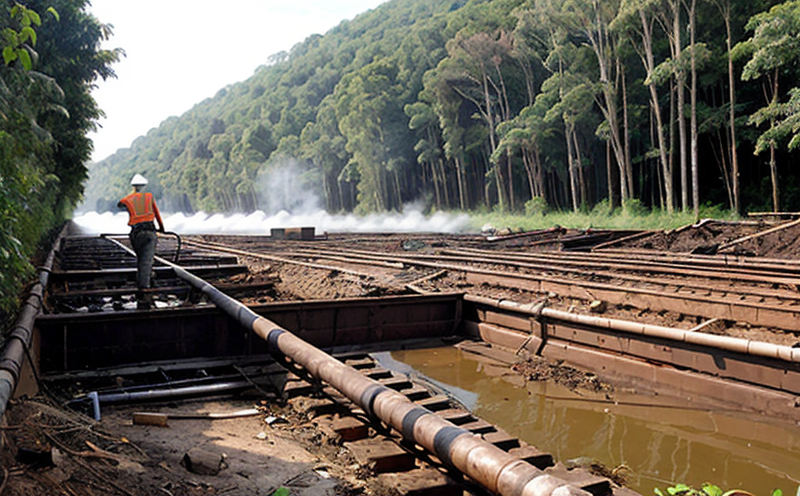UNEP Environmental Compliance and Risk Assessment Test
The UNEP (United Nations Environment Programme) Environmental Compliance and Risk Assessment Test is a comprehensive evaluation designed to ensure that organizations meet all relevant environmental regulations, standards, and best practices. This test evaluates an entity's compliance with international norms such as ISO 14001 and the Basel Convention on the Control of Transboundary Movements of Hazardous Wastes.
Our testing service focuses on identifying potential risks to the environment that could arise from a company's operations, products, or services. By conducting this test, organizations can mitigate environmental impacts, enhance their reputation, and avoid costly fines and penalties associated with non-compliance. The UNEP Environmental Compliance and Risk Assessment Test is particularly beneficial for companies in sectors such as manufacturing, chemicals, pharmaceuticals, and waste management.
The testing process begins with an initial audit of the organization's current environmental policies and procedures. This includes a review of existing documentation, interviews with relevant personnel, and inspections of operational areas. Following this assessment, our team will identify any gaps or deficiencies in compliance. Based on these findings, we develop a detailed risk management plan tailored to the specific needs of the organization.
The test covers a wide range of parameters, including air quality, water quality, waste generation, emissions monitoring, and energy efficiency. For each parameter, we follow internationally recognized standards such as ISO 14067 for greenhouse gas emissions and ASTM D5289 for sampling techniques in environmental analysis.
Once the assessment is complete, our team provides a detailed report outlining all findings and recommendations for improvement. This report serves as a roadmap for implementing corrective actions to ensure full compliance with applicable regulations. Additionally, it offers insights into how the organization can improve its overall environmental performance.
By undergoing this test, organizations demonstrate their commitment to sustainability and corporate social responsibility. It also helps build trust among stakeholders, including customers, regulators, and investors. The UNEEP Environmental Compliance and Risk Assessment Test is an essential tool for any company seeking to protect the environment while maintaining regulatory compliance.
- Compliance with ISO 14001:2015
- Conformity assessment of emissions under the Kyoto Protocol
- Evaluation of hazardous waste management practices according to Basel Convention standards
- Assessment of air quality in accordance with World Health Organization guidelines
- Verification of water treatment processes against EPA regulations
In conclusion, the UNEP Environmental Compliance and Risk Assessment Test is a vital service for organizations seeking to ensure they are meeting their environmental responsibilities. By identifying potential risks early on, companies can take proactive steps to mitigate these issues, ultimately leading to improved sustainability practices.
Why It Matters
Environmental compliance and risk assessment are critical components of any organization's sustainability strategy. Failure to adhere to environmental regulations can lead to significant financial penalties and reputational damage. In many cases, non-compliance may result in legal action or even criminal charges.
The UNEP Environmental Compliance and Risk Assessment Test provides organizations with the tools necessary to avoid these pitfalls. By conducting regular audits, companies can identify potential areas for improvement before they become major issues. This proactive approach not only helps maintain compliance but also demonstrates a commitment to environmental stewardship that resonates positively within communities.
Moreover, by reducing operational risks related to environmental factors, organizations can enhance their long-term viability. A well-managed environment contributes directly to the health and safety of employees, customers, and local populations. It fosters innovation in green technologies and processes while promoting economic growth through sustainable practices.
In today’s competitive market, consumers increasingly prefer brands that prioritize sustainability over profit alone. Companies that demonstrate leadership in environmental protection are more likely to attract customers who value eco-friendly products and services. Therefore, investing in robust environmental compliance measures is not just a legal requirement; it's also good business practice.
Scope and Methodology
The scope of the UNEP Environmental Compliance and Risk Assessment Test encompasses all aspects of an organization’s operations that could impact the environment. This includes but is not limited to manufacturing processes, product lifecycle stages, supply chain management practices, and end-of-life disposal methods.
Our methodology involves several key steps:
- Initial Consultation: We begin by meeting with key stakeholders from various departments within the organization. This allows us to gain a comprehensive understanding of their current environmental initiatives and challenges.
- Data Collection: Next, we gather data through interviews, document reviews, field visits, and laboratory analyses. This information forms the basis for our risk assessment.
- Risk Identification: Using advanced analytical techniques, we pinpoint potential risks associated with each identified environmental impact area.
- Recommendations: Based on our analysis, we provide actionable recommendations aimed at enhancing compliance and minimizing risks. These suggestions are designed to be practical and cost-effective.
- Continuous Improvement: We encourage ongoing evaluation of the implemented changes through periodic follow-up audits until full compliance is achieved.
This structured approach ensures that every aspect of an organization’s operations receives thorough scrutiny, ensuring no stone is left unturned when it comes to safeguarding our planet's resources.





